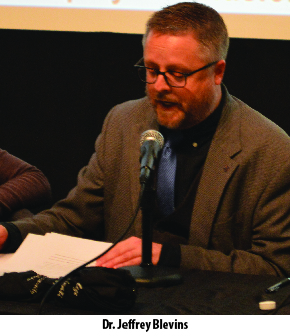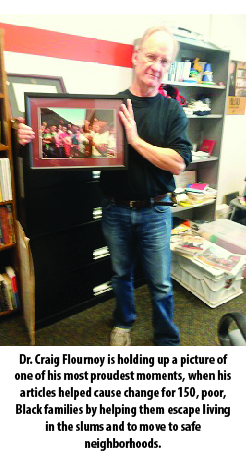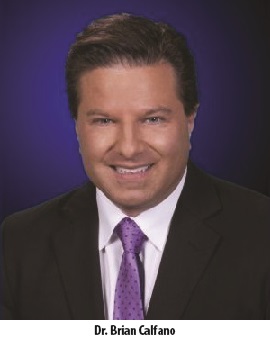Interview with The Journalism Department: Taft's Newest Addition
Conducted by Rasha Aly
And then there were 14.
It was Nov. 14, 2017, and Dr. Jeff Blevins had just received the good news. This good news was more than 5 years in the making.
The Center’s Board of Trustees had just voted unanimously to make the Journalism Department one of its humanities departments. This makes a total of 14 UC departments that are eligible to receive funding for its undergraduate, graduate, and faculty scholarships.
 Dr. Blevins did not know if he wanted to be a Bearcat before he came to UC. “It was tough to leave and build something new from the ground up,” said Blevins, who is now the head of the Journalism Department. The year Blevins came to UC, in 2012, was the same year the Journalism Department came into being, as it separated from being a program in the English Department. He arrived at UC, after spending eight years at Iowa State University’s Greenlee School of Journalism and Communication, knowing he would be leading the way in reconstructing the department from scratch.
Dr. Blevins did not know if he wanted to be a Bearcat before he came to UC. “It was tough to leave and build something new from the ground up,” said Blevins, who is now the head of the Journalism Department. The year Blevins came to UC, in 2012, was the same year the Journalism Department came into being, as it separated from being a program in the English Department. He arrived at UC, after spending eight years at Iowa State University’s Greenlee School of Journalism and Communication, knowing he would be leading the way in reconstructing the department from scratch.
And, he has accomplished just that.
One of the biggest achievements is the department becoming the Center’s newest humanities department. Before, when the English Department housed the Journalism program, journalism students could receive Taft funding due to the English Department being a Taft humanities department. However, once the department stood on its own, it no longer was a Taft humanities department, and faculty and students could no longer receive Taft money – until that day, in November, when the trustees voted to incorporate the Journalism Department once again into its fold.
Still, Blevins – the minute he stepped through his new office door in McMicken in 2012, he had his eyes on joining the Taft Center once again. When Blevins first approached the center, Dr. Jana Braziel was the Center’s director. The Journalism Department had just separated from the English Department and was still trying to find its own path within UC. Braziel told Blevins the department needed to prove itself before applying for a Taft departmenship, Blevins said. Braziel had said, “Let’s see how things evolve.”
Since 2012, the department has evolved. The department hired two more faculty member. Pulitizer-prize winner and Assistant Professor Craig Flournoy became a part of the department in 2014, and Assistant Professor Brian Calfano, who has joint appointment with the Political Science Department joined in 2016. These two journalists contributed a great deal to what the journalism department is today.
In 1986, Columbia University School of Journalism officials awarded Flournoy, his reporting partner, George Rodrigue, and the Dallas Morning News with the Pulitizer Prize for National Reporting for their work on a news series, “Separate And Unequal,” that uncovered illegal housing segregation across the United States. However, Flournoy, who worked as an investigative reporter at the Dallas Morning News for more than 20 years, says winning the Pulitzer Prize was great, but it is not what gave him the motivation to do his job. His motivation is his desire to help create more social justice.
 Flournoy’s passion to expose unjust actions in society is contagious. His students have already caught the social justice but to use journalism to expose inequality in different areas of society. In 2015, the Investigative Reporters and Editors, a 41-year-old non-profit, awarded Flournoy’s investigative reporting class with a national award for the piece, Robin Hood in Reverse, which focused on how most of Ohio’s university are using students’ paid tuition funds to cover deficits from the athletics department.
Flournoy’s passion to expose unjust actions in society is contagious. His students have already caught the social justice but to use journalism to expose inequality in different areas of society. In 2015, the Investigative Reporters and Editors, a 41-year-old non-profit, awarded Flournoy’s investigative reporting class with a national award for the piece, Robin Hood in Reverse, which focused on how most of Ohio’s university are using students’ paid tuition funds to cover deficits from the athletics department.
These undergraduate students impressed Flournoy. “They are hungry,” Flournoy said. “They are desperate to learn.” He is teaching the class again this semester, and the students love working on their projects. Whenever they have an update in their investigation projects, they call Flournoy to let him know about the news.
In addition, Flournoy will be one of the presenters at the “Fair Housing Act After 50 Years,” Symposium on March 28, 2018. The Cardozo Law Review invited Flournoy to speak on the panel, “Origins and Development of the FHA: A Look Back.” His article, which will be based on his presentation, will also be published in the 40th Volume of the Cardozo Law Review’s 40th Volume.
And, there are other journalism projects that have gained prestige. To find out more about Dr. Flournoy's Pulitzer, click here.
Dr. Calfano
Dr. Calfano, was excited to have joined the Journalism Department. “I just thought it was a really exciting group,” Calfano said of the department’s faculty and staff during his first interview. “Journalism is very important to our country. It was useful to me to be a part of that department.”
Calfano received both his Master’s and doctorate in political science, but he was always interested in the intersection of journalism with political science. Being a part of the Journalism Department allows him to expand upon his journalism skills.
The assistant professor published a book, A Matter of Discretion: The Politics of Catholic Priests in the United States and Ireland, which he co-authored with Melissa Michelson, a professor of political science at Menlo College, and Elizabeth Oldmixon, also a political science professor, who works at the University of North Texas. The book analyzes how priests determine their political attitudes, and the authors discovered that much of a priest’s political attitude is based on what the bishop believes. Calfano co-authored another book, God Talk: Experimenting with the Religious Causes of Public Opinion, with Paul Djupe, a political scientist at Denison University. The book explores how religion can influence public opinion and politics.
Calfano also balances the responsibilities of being a professor with his responsibilities as a television station reporter for a CBS affiliate, KOLR10, in Springfield, Missouri. His news work focuses on political analysis, and soon he will have his own TV talk show, Ozarks Tonight, which will air in both Missouri and Arkansas. Having a foot in both of these worlds – academics and journalism – gives him the experience he needs to teach students about each realm. “It benefits the students at the end,” he said.
 Calfano also added he is he would not be where he is today without the support of the university for the work he does in and outside of the university. UC administrators, “have given me the ball, and I go and run with it,” he said.
Calfano also added he is he would not be where he is today without the support of the university for the work he does in and outside of the university. UC administrators, “have given me the ball, and I go and run with it,” he said.
Blevins has also contributed to the department’s success. In 2013, the History Division of the Broadcast Education Association awarded him first place for his research on corporate speech rights in the United States. He was also a 2016-17 scholar for the Cincinnati Project, a local collective which garners the resources of Cincinnati community members, non-profits, governments, and agencies to conduct research on four specific pillars: economic justice, health equity, racial equality, and improved conditions for women. Blevins’ research for the Cincinnati Project concentrated upon social media and social justice movements.
Another project is a documentary that has become a huge success.
Alongside Parr, Professor Emeritus Jon Hughes, and Associate Professor-Educator Sean Hughes are working on three-series documentary that illustrates how the scarcity of water affects different, marginalized groups. Their first documentary, the Intimate Realities of Water, follows the lives of Kenyans, specifically those who live in Nairobi’s slum neighborhoods, and the challenges they must overcome just to obtain clean water for their families.
“It is not an accident that the documentary received so many awards,” Blevins said. The documentary became an immediate success. The rewards the documentary received include “Best Documentary” at the United International Independent Film Festival; “Best Cultural Feature” at the Hollywood International Independent Awards festive; and “Best Picture” at the Los Angeles Independent Film Festival.
Throughout the years, the Journalism Department has received a number of awards, including grants and sponsorships from the National Endowment for the Humanities, the National Endowment for the Arts, Ohio Arts Council, the Greater Cincinnati Foundation, Maxwell C. Weaver Foundation, Fine Arts Fund, Ohio Humanities Council, Ohio Historical Society, Cincinnati Historical Society Library, Western Reserve Historical Society, Center for History and New Media, Ohio Association of Historical Societies and Museums, the Thomas R. Schiff Fund at the Greater Cincinnati Foundation, and the Lafcadio Hearn Society in Japan. The UC Department of English and Comparative Literature had begun teaching journalism courses in the mid-1950s. About 20 years later, in 1977, the department offered a journalism certificate. Then the English Department, began offering a BA in journalism. Department administrators awarded the first degree in March 2006. Then, in 2012, the Journalism Department left the English Department nest to fly out on its own.
Other faculty members who were already a part of the department included Sean Hughes, educator associate professor of journalism, photojournalism and design coordinator; Pama Mitchell, educator associate professor ; and Jennifer Wohlfarth, director of undergraduate studies and educator professor. Mitchell has a joint appoint with the communications department as well. Emeriti Faculty, who were a part of the faculty when Blevins joined the department, includes professors Jon Hughes and James Wilson.
[1] FHA is the acronym for the Fair Housing Act.